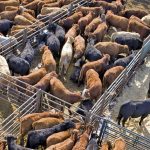After two years of starving, Canada’s canola crushers are salivating at the sight of a good crop.
“It’s looking much better this year and everybody’s feeling more optimistic,” said Robert Broeska, executive director of the Canadian Oilseed Processors’ Association.
Two years of drought-shortened crops have left processors running far below capacity and profitability. Processors are now running at about 50 percent of capacity.
Crushers were pessimistic about the future during the winter as they feared a continuation of the drought, but their mood lightened when good spring rains fell on most of the dry areas.
Read Also

VIDEO: Catch up with the Western Producer Markets Desk
The Western Producer Markets Desk provides daily updates on agricultural markets, with recent video commentary including looks into canola, wheat, cattle and feed grains.
Some traditionally strong canola production areas, such as parts of northeastern Saskatchewan, remain dry but most areas appear to be in good condition, Broeska said.
Once the new crop is in the bin, canola marketers will hope to find more sellers than they were serving before the drought.
“There are more markets to serve,” said Broeska.
North American food manufacturers want more canola oil but have not been able to get large quantities for two years. That has been frustrating for them and for the Canadian canola industry.
“With that growth in demand comes an expectation from the customers that they will see a continuous flow of product,” said Broeska. “When they don’t, you can get into a troublesome situation.”
He hopes canola users will be lured back before they look for different suppliers.
Broeska said the small canola crops have also shut the door on a huge new market.
“We worked long and hard with Canadian trade negotiators to get access to China through the World Trade Organization access negotiations and just when we got to the opening volley of quotas and tariffs, we ran into our drought problems,” said Broeska.
Nolita Clyde, editor of Statcom Ltd.’s canola report, said optimism is sweeping through the canola industry as most prairie crops continue to experience good growing conditions.
“They still have to make sales, but it’s a lot better,” said Clyde.
“At least you’re in the game.”

















